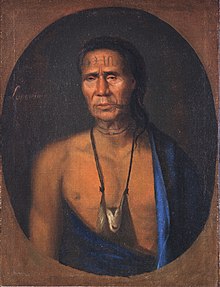Lappawinsoe | |
|---|---|
 Lappawinsoe, painted by Gustavus Hesselius | |
| Lenape (Delawares) leader | |
| Personal details | |
| Known for | Signing the Walking Purchase agreement for land cession of 1737 with the sons of William Penn |
Lappawinsoe[1] /ˌlæpəˈwɪnzoʊ/ was a Lenape chief. His name signifies "gathering fruit" or "going away to gather food".[2][3][4][5] Lappawinsoe sold the land of his tribe to Thomas Penn (1702-1775), and John Penn ("the American") (1700-1746), the sons of William Penn (1644-1718), the founder, with moderate Quaker philosophies of the Colony and Province of Pennsylvania in 1681 (later the American state – Commonwealth of Pennsylvania after 1776), through the controversial and disputed Walking Purchase treaty agreement of 1737.[6] Three other Lenape-Delaware chiefs also signed the agreement: Tishecunk (sometimes referred to as Tishcohan, "tash-suk-amen" meaning "he never blackens himself"), Nutimus ("striker of fish with a spear") and Menakihikon ("a King of the Minissincks").[7][8][5] Documentation shows that Nutimus was considered the principal Indian leader of the tribes located further southeast in the future State of Delaware.[9]
- ^ Also spelled Lappawinzo, Lapowinzo, or Lapowinsa.
- ^ Buck, William J. (1883). "Lappawinzo and Tishcohan, Chiefs of the Lenni Lenape". The Pennsylvania Magazine of History and Biography. 7 (2): 215–218. JSTOR 20084604.
- ^ Penn, William (1970). William Penn's own account of Lenni Lenape or Delaware Indians. Myers, Albert Cook, 1874–1960,, Pomfret, John E. (Rev. ed.). Moorestown, N.J.: Middle Atlantic Press. ISBN 0912608137. OCLC 233931836.
- ^ "Walking Purchase | Encyclopedia of Greater Philadelphia". philadelphiaencyclopedia.org. Retrieved 2017-11-18.
- ^ a b Becker, Marshall J. (1982). "Search for the Lenape Indians". Archaeology. 35 (3): 10–19. JSTOR 41727825.
- ^ "The State Museum of Pennsylvania Presents An Image of Peace: The William Penn Treaty". statemuseumpa.org. Retrieved 2017-12-03.
- ^ Kraft, Herbert C. (1986). The Lenape : archaeology, history, and ethnography. Newark: New Jersey Historical Society. ISBN 0911020144. OCLC 13062917.
- ^ Weslager, C. A. (1972). The Delaware Indians; a history. New Brunswick, N.J.: Rutgers University Press. ISBN 0813514940. OCLC 282073.
- ^ Kenny, Kevin (2009). Peaceable kingdom lost : the Paxton Boys and the destruction of William Penn's holy experiment. Oxford: Oxford University Press. ISBN 9780195331509. OCLC 245598485.
